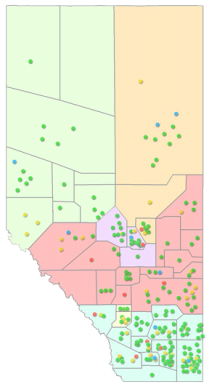Connection Project Reporting
The AESO publishes information for all projects following the AESO Connection Process on a monthly basis. This includes information about in-progress projects with an accepted System Access Service Request (SASR), recently energized projects, and recently cancelled projects. Below you will find project data reported in an Excel Project List, a GIS map, and a new interactive Power BI dashboard.
Connection Project List Dashboard
The Connection Project List Dashboard is an interactive Power BI dashboard that displays the most recent data from the Connection Project List. Users can click on various elements within the dashboard to filter the information and explore the data in greater depth to gain valuable insights.
We welcome your input and feedback on this new interactive tool. Please share your comments by sending an email to customer.connections@aeso.ca.
The latest project list and a guide explaining the information provided in the list can be found here:
-
Click the project map on the right to open the interactive mapping tool. A guide for using the map and a downloadable GIS shapefiles and Google Earth KMLs showing project locations and existing generation can be found below:
- Connection Project Map User Guide
- Project List GIS Shapefile
- Project List KML
- Existing Generation GIS Shapefile
- Existing Generation KML
For any questions or comments on the Connection Project List and map, please email customer.connections@aeso.ca
Project list and Map updated 2025-07-03
-

